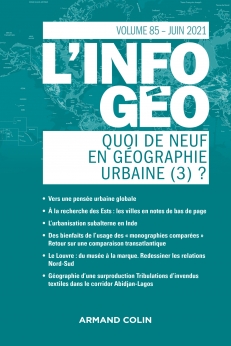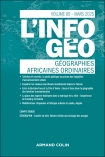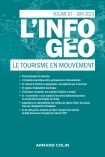
L'INFORMATION GÉOGRAPHIQUE (2/2021)
Pour acheter ce numéro, contactez-nous
Recevez les numéros de l'année en cours et accédez à l'intégralité des articles en ligne.
En Afrique de l’Ouest, des stocks de textiles neufs invendus sont quotidiennement écoulés. Provenant d’Asie et d’Europe, ces marchandises trouvent une place toute particulière sur des marchés : contrefaçons, fripes et vêtements dits « traditionnels » y sont commercialisés. Cet article étudie le développement d’une filière de (re)commercialisation des rebuts industriels textiles. Cet objet qu’est l’invendu invite à explorer les liens entre Nord et Sud mais aussi entre les différents pays du Sud, entre les périphéries de la mondialisation qui révèlent des logiques de surproduction et de leur gestion. Ce texte propose de suivre certaines marchandises et, avec elles, des personnes, des modes de production, des idées qui circulent le long du corridor urbain ouest-africain entre Abidjan et Lagos. Appréhender la circulation des invendus permet d’illustrer la mondialisation par le bas.
In the large west African markets, unsold stocks of new textiles are sold daily. Coming from Asia and Europe, these goods find a special place in markets saturated with counterfeit, second-hand and so-called "traditional" clothes. This paper studies the perpetuation of a (re)commercialization channel for industrial textile waste. This particular object, the unsold goods, invites us to explore the links between North and South, but also between the different countries of the South, between the peripheries of globalization, shedding light on the logics of overproduction and their management. This text proposes to follow certain goods and, with them, people, modes of production and ideas that circulate along the West African urban corridor between Abidjan and Lagos. Understanding the circulation of unsold goods is also an illustration of globalization from below.

